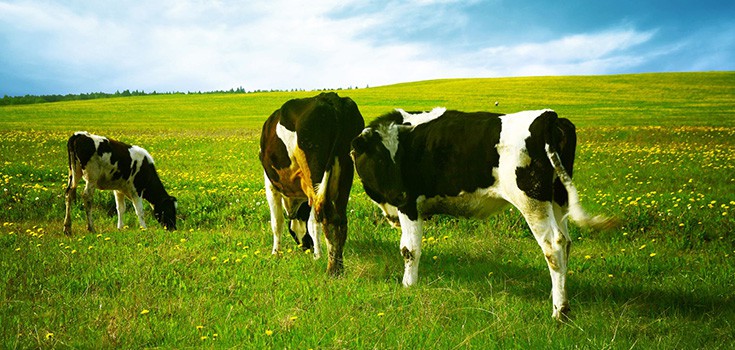Environmental Reasons to Choose Grass-Fed Beef

There are those of us who abstain from meat and those who see such a lifestyle choice as a travesty. If you’re of the latter group and you like your meat red, you should consider switching to grass-fed (if you haven’t already). Not only for your own health, but for the health of the planet.
In 2006 the United Nations announced that about 18% of the world’s manmade greenhouse gases came from livestock. These aren’t your grandfather’s farms that are raising cattle from calf to slaughter, they are massive operations filled to the brim with livestock that is larger than ever. The fact that livestock accounts for 18% of the world’s manmade greenhouse gases is significant—that’s more than transportation. Some say that these large livestock operations are one of the leading contributors to climate changes.
Rainforests are cleared to produce grain for the typical cattle operation and to raise the cattle themselves. In addition, these operations have cleared “millions of acres” of grasslands and depend far more heavily on transportation.
“Much of the carbon footprint of beef comes from growing grain to feed the animals, which requires fossil-fuel-based fertilizers, pesticides, transportation,” says the author of The Omnivore’s Dilemma Michael Pollan. “Grass-fed beef has a much lighter carbon footprint.”
But grass-fed beef doesn’t only improve the environment by hurting it less, they are proactive in their environmentalism.
Read: Factory Farms Produce 100x more Waste than U.S. Population
Cattle on grasslands are part of an ecological system. One in which the grass and plant life feeds the cattle, and the cattle in turn feeds the plant life with rich, natural fertilizer. A 2010 USDA study found that “moderately grazed areas actually have more stored carbon in the soil,…increasing fertility…”
Grazing also prevents soil erosion and promotes cleaner water. If the beef is organic, that’s even better as the natural water sources aren’t contaminated with antibiotic and hormone-laden waste matter.
If you’re going to eat beef, buying grass-fed might be a little more expensive, but the benefits are worth the cost. We have to be more conscious about our food choices and how they affect everything from our waistline to the planet as a whole.
Additional Sources:

Good points. I hadn't thought of this…